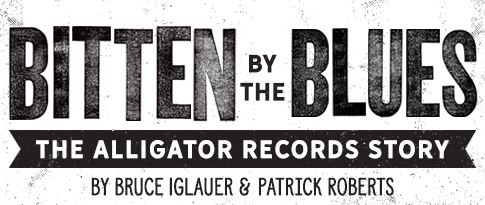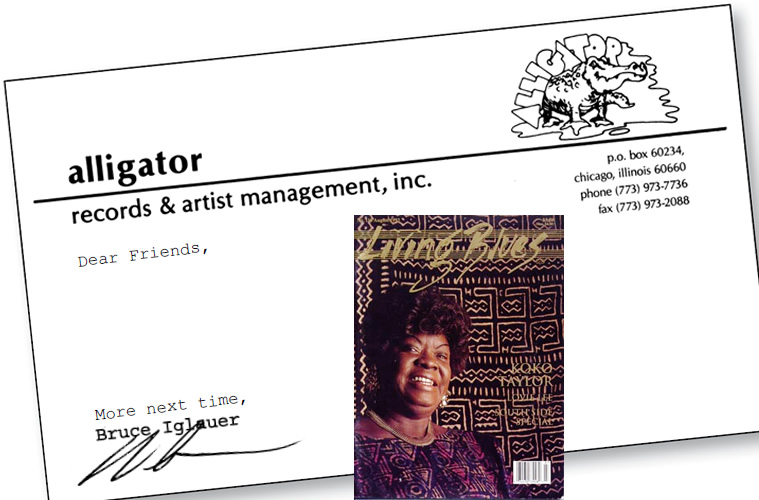Dear Friends,
I’m leaving tomorrow morning for Spain and Israel, working my usual summer jot as Koko Taylor’s roadie, so I’m writing this in a hurry. I’m just back from Los Angeles where I was helping remix a brand new album by one of Chicago’s blues harmonica legends, Billy Boy Arnold. Billy is back on the blues scene after over twenty years, working with a California band called the Taildraggers, and he’s playing and singing better than ever, I’ll tell you more about this one when we’re ready to release it, which will be later this summer, but if you love ’50s style Chicago blues, this record will be for you.
If you’re into hot slide guitar and enjoy your blues at a rock and roll energy level, you’ll be happy to know that the Australian bottleneck roaster, Dave Hole, has a brand new album ready to roll. It’s called “Working Overtime” and it will be on the streets just about the time you read this,, Dave has been touring Europe with Gary Moore and his playing is even wilder than on his previous album, last year’s “Short Fuse Blues.” I know some of you purists think Dave is too rocked out, but remember GUITAR PLAYER magazine calls him “utterly blues approved.” Dave should be touring the U.S. for the first time later this year, so you’ll get a chance to decide for yourself if those people from Down Under can really play and sing the blues. You know what we think!
Looking back over these reminiscences, I realize I never did tell you about recording Son Seals’ third album, “Chicago Fire.” As Son and I are getting ready to start on his sixth Gator, thus seems like the right time.
By 1980, Son had become something of an established Chicago blues star. Ever since the success of “Midnight Son,” (the album for which he was hailed as the most important bluesman of his generation) he had been touring nationwide as well as making occasional trips to Europe. Of course, most of his gigs were still in Chicago, because cities like New York and Los Angeles still had few clubs willing to risk booking touring bluesmen, Son’s band at the time was super-tight, built around his long-time bass player Snapper Mitchum, a young drummer named David Anderson and a veteran keyboard player called King Solomon, the same core group who played with him on “Blues Deluxe.” With a band that knew his every move, Son was determined to make another giant (and, as it turned out, controversial) musical step forward, as big a step as he had made with “Midnight Son.” He composed a bunch of new songs, allowing himself only three cover tunes for the new album. The original songs were original indeed, many of them challenging the normal blues forms and rhythms. Again, Son wanted to make not only his regular band but also a big horn section part of his way of expressing himself. As with “Midnight Son,” he called on Bill. MacFarland to lead the horns, but this time he pushed.Bill to write more challenging and unusual horn parts than those he had used for their previous collaboration.
We rehearsed “Chicago Fire” down at Solomon’s little coach house/apartment on the South Side, crammed into his tiny living room, which was decorated mostly with a Hammond B3 organ. The horn players stood in the hall, and Snapper was almost in the kitchen. For hours every day, Son and the musicians worked to fine tune the songs, with Son being his usual dictatorial self but sometimes letting one of us throw in an idea or two. After three tough and sweaty weeks of rehearsal, we were ready to go into Curtom Studios. With my usual tight budgets, I knew we had to do virtually all the recording of a very difficult, precise and challenging album in only two nights.
More next time,
Bruce Iglauer

